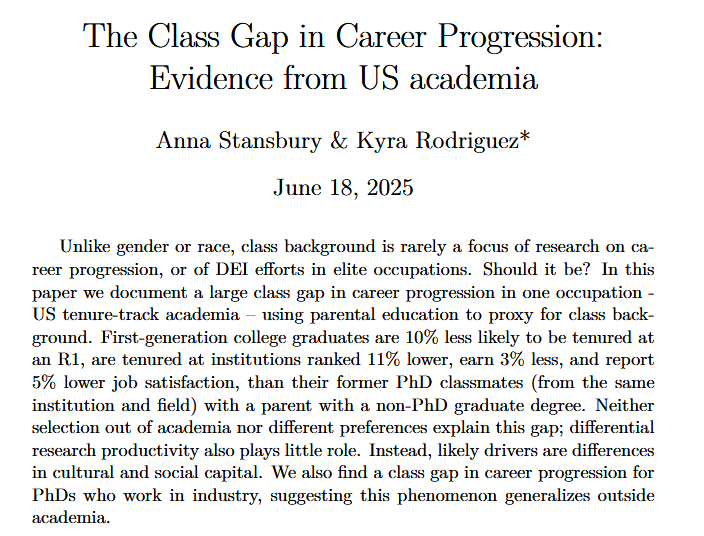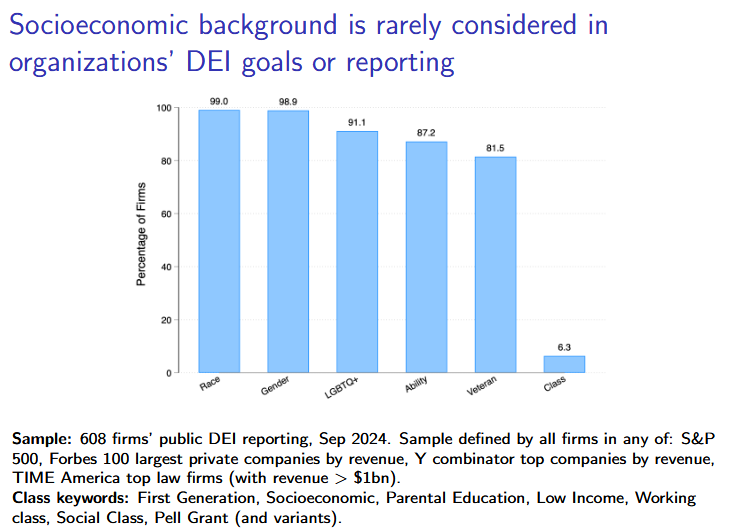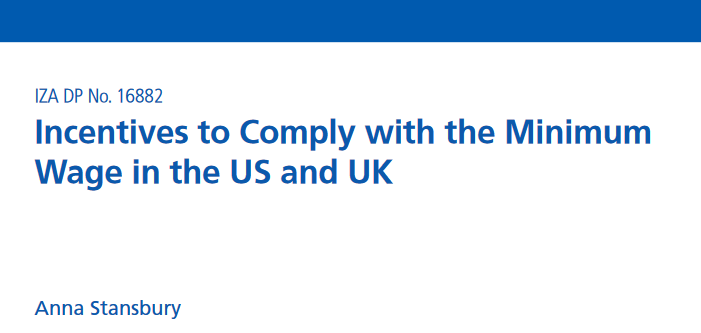📢New WP!📢 The Class Gap in Career Progression: Evidence from US Academia, w/ Kyra Rodriguez
Class is rarely a focus of research or DEI in elite US occupations.
Evidence suggests it should be: we find a large class gap in at least one occupation - tenure-track academia...🧵
Class is rarely a focus of research or DEI in elite US occupations.
Evidence suggests it should be: we find a large class gap in at least one occupation - tenure-track academia...🧵

📖🎓SETTING: US tenure-track academia
📈📉DATA: NSF's Survey of Doctorate Recipients 1993-2021.
This is a representative sample of all graduates of US PhD programs in STEM and Social Sciences. We see snapshots of the careers of tens of thousands of people. (2/22)
📈📉DATA: NSF's Survey of Doctorate Recipients 1993-2021.
This is a representative sample of all graduates of US PhD programs in STEM and Social Sciences. We see snapshots of the careers of tens of thousands of people. (2/22)
❓How to measure class❓
We use PARENTAL EDUCATION🧑🎓
- first-gen college grads
- parent w/ BA
- parent w/ non-PhD grad degree (JD, MD, MBA, EdM...)
We're less interested in PhD parents b/c it reflects academia-specific advantage, not generalized socioeconomic advantage. (3/22)
We use PARENTAL EDUCATION🧑🎓
- first-gen college grads
- parent w/ BA
- parent w/ non-PhD grad degree (JD, MD, MBA, EdM...)
We're less interested in PhD parents b/c it reflects academia-specific advantage, not generalized socioeconomic advantage. (3/22)

🚨We find a large class gap:🚨
*Conditional on PhD program attended*, first-gen college grads are
➡️13% less likely to end up tenured at an R1, and
➡️ tenured at places ranked 9% lower
compared to their PhD classmates who had a parent with a (non-PhD) graduate degree. (4/22)
*Conditional on PhD program attended*, first-gen college grads are
➡️13% less likely to end up tenured at an R1, and
➡️ tenured at places ranked 9% lower
compared to their PhD classmates who had a parent with a (non-PhD) graduate degree. (4/22)

This class gap between PhD classmates arises on the post-PhD job market.
*In addition*, when we look at the tenure decision point, we see a large class gap in the rate of getting tenure - even conditional on fixed effects for tenure-track institution. (5/22)
*In addition*, when we look at the tenure decision point, we see a large class gap in the rate of getting tenure - even conditional on fixed effects for tenure-track institution. (5/22)

The gap is *not* driven by differential selection out of academia into industry. There's no class gap in ending up tenured *anywhere* conditional on PhD - the class gap exists entirely on the intensive margin - WHERE someone is tenured.
(This was surprising to us). (6/22)
(This was surprising to us). (6/22)

Why might this gap emerge? We can explore a few mechanisms:
1⃣ Research Productivity
2⃣ Networks
3⃣ Choice/Preferences
(7/22)
1⃣ Research Productivity
2⃣ Networks
3⃣ Choice/Preferences
(7/22)
RESEARCH: If we see lower-SEB academics producing less research than their former PhD classmates, this could be because of
- differential ENDOWMENTS of research ability pre-PhD, or
- differential opportunities to DEVELOP their research ability during PhD & tenure track. (8/22)
- differential ENDOWMENTS of research ability pre-PhD, or
- differential opportunities to DEVELOP their research ability during PhD & tenure track. (8/22)

Re-running our baseline regressions controlling for research closes at most a third of the class gap.
Among those tenured at ranked institutions, there is still an 11% class gap in rank - even conditional on highly detailed measures of research quantity and quality! (9/22)
Among those tenured at ranked institutions, there is still an 11% class gap in rank - even conditional on highly detailed measures of research quantity and quality! (9/22)

This comes mostly from higher-SEB academics being more likely to be “overplaced” – tenured at institutions that are higher-ranked than you’d predict given their research record
– and not so much from lower-SEB academics being more likely to be “underplaced”.
(10/22)
– and not so much from lower-SEB academics being more likely to be “underplaced”.
(10/22)

If research doesn't close most of the class gap, suggests something else must be at play.
Another candidate: NETWORKS
Differential social & cultural capital, as well as homophily, could make it harder for lower-SEB academics to form valuable professional relationships (11/22)
Another candidate: NETWORKS
Differential social & cultural capital, as well as homophily, could make it harder for lower-SEB academics to form valuable professional relationships (11/22)

This can affect both
*actual research output* (less mentorship, fewer collaborators) as well as
*signals of research output* (lower quality recommendation & tenure letters, fewer seminar invites, award opportunities, citations)
Both of these will matter for tenure.
(12/22)
*actual research output* (less mentorship, fewer collaborators) as well as
*signals of research output* (lower quality recommendation & tenure letters, fewer seminar invites, award opportunities, citations)
Both of these will matter for tenure.
(12/22)
We find evidence of weaker coauthorship networks for lower-SEB academics:
1. COAUTHOR HOMOPHILY: first-gen college grads are more likely to coauthor with other first-gen college grads than you would predict from coauthors' characteristics (inst, field, race, gender, etc) (13/22)
1. COAUTHOR HOMOPHILY: first-gen college grads are more likely to coauthor with other first-gen college grads than you would predict from coauthors' characteristics (inst, field, race, gender, etc) (13/22)

(suggestive of frictions to forming prof. relationships across SEB, and thus smaller networks, since most academics at elite institutions have elite backgrounds...) (14/22)
2. LESS WELL-PUBLISHED COAUTHORS: first-gen college grads' coauthors are less well-published - in terms of publications, citations, or journal impact factor - than you would predict from these coauthors' other characteristics (institution, field, race, gender, SEB, etc).
(15/22)
(15/22)

We also find that lower-SEB academics are *less likely to receive NSF awards* than their higher-SEB peers
- even conditional on employer institution, tenure status, detailed measures of prior publication record, *and* prior NSF award receipt.
(16/22)
- even conditional on employer institution, tenure status, detailed measures of prior publication record, *and* prior NSF award receipt.
(16/22)

Finally, we look at CHOICE: do lower-SEB academics choose to work at lower-ranked schools for other reasons?
We don't find any action on this - whether we look at financial, family, or location constraints, institution type, or self-reported preferences. (17/22)
We don't find any action on this - whether we look at financial, family, or location constraints, institution type, or self-reported preferences. (17/22)
Does this matter for other quality of life outcomes?
Yes - the class gap in institution type ALSO comes alongside a class pay gap in academia, and a class gap in job satisfaction.
(18/22)
Yes - the class gap in institution type ALSO comes alongside a class pay gap in academia, and a class gap in job satisfaction.
(18/22)

(Note also: the class gap is NOT driven by other correlated characteristics, like race. We control for race/ethnicity and birth region fixed effects in all our specifications, and we find a class gap even among White non-Hispanic US-born academics.) (19/22).
Is this just about academia?
NO. There is also a class gap in career progression for PhDs in industry. Specifically: a pay gap, a gap in job satisfaction, and widening gaps in pay and in managerial responsibilities over the career (conditional on baseline FEs). (20/22).
NO. There is also a class gap in career progression for PhDs in industry. Specifically: a pay gap, a gap in job satisfaction, and widening gaps in pay and in managerial responsibilities over the career (conditional on baseline FEs). (20/22).

We see these results as relevant across elite labor markets, not just in academia.
DEI efforts across elite occupations almost never mention class background, and data is rarely collected. This is a problematic omission!
(21/22)
hbr.org/2021/01/the-fo…

DEI efforts across elite occupations almost never mention class background, and data is rarely collected. This is a problematic omission!
(21/22)
hbr.org/2021/01/the-fo…

This paper and a great growing lit in sociology tells us that we need *much more work* to examine class – like we do race and gender – and its role in elite labor markets.
Here's the paper!
(/end)annastansbury.github.io/website/Stansb…
Here's the paper!
(/end)annastansbury.github.io/website/Stansb…
PS: My coauthor Kyra Rodriguez is a superb incoming PhD student at @BerkeleyHaas , who has been working with me at MIT these last two years. Keep your eyes out for her!
linkedin.com/in/kyrarodrigu…
linkedin.com/in/kyrarodrigu…
• • •
Missing some Tweet in this thread? You can try to
force a refresh
















